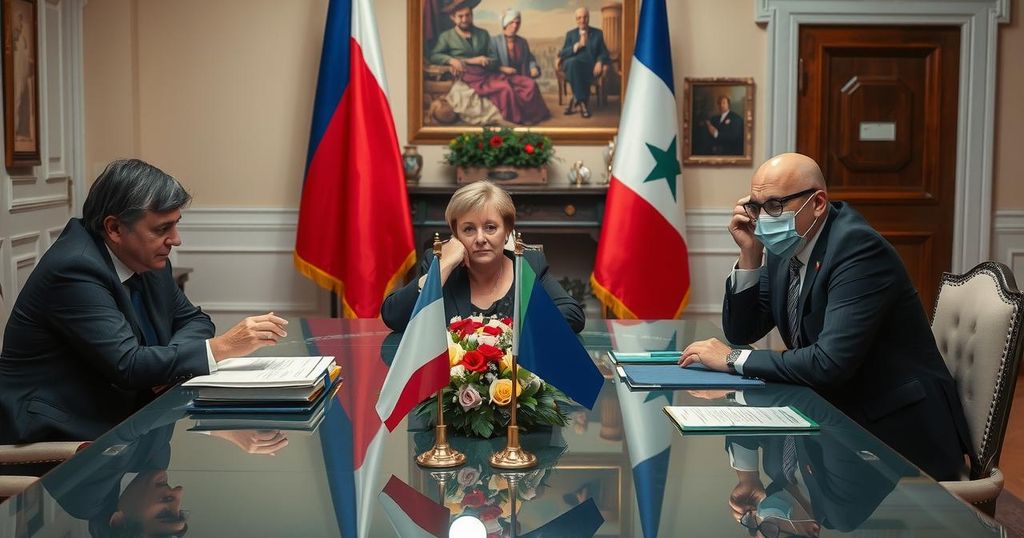German and French Foreign Ministers Advocate for Peaceful Transition in Syria

The foreign ministers of Germany and France recently met with Syria’s new leader Ahmed Al-Sharaa in Damascus, marking the first EU ministerial visit since President Bashar Al-Assad’s ouster. The ministers emphasized the importance of a peaceful transition of power and respect for minority rights. Their visit included discussions on transitional justice and plans to assist Syria in drafting a new constitution.
On Friday, the foreign ministers of Germany and France conducted an unprecedented visit to Syria, meeting with the country’s new de facto leader, Ahmed Al-Sharaa, in Damascus. This visit represents the first engagement of European Union representatives with Syria following the ousting of President Bashar Al-Assad in December. Ministers Annalena Baerbock and Jean-Noel Barrot expressed intentions to forge a new diplomatic relationship with Syria, advocating for a peaceful transition of power and emphasizing the need for moderation and respect for minority rights in governance.
The visit is a strategic signal of hope and reconciliation, particularly aimed at encouraging the Islamist faction, Hayat Tahrir al-Sham (HTS), led by Al-Sharaa. Baerbock characterized the mission as an “outstretched hand” from the EU intended to foster a renewed political relationship. The ministers explicitly conveyed their expectations on upholding principles that ensure the safety and rights of all citizens. In her remarks, Kaja Kallas, the EU’s foreign policy chief, highlighted that protecting civilians and minority groups is essential in this transformation.
While in Syria, both ministers also toured the notorious Sednaya prison, where they witnessed firsthand the atrocities of the past regime, with Barrot describing the facility as akin to a “concentration camp style of hell.” He articulated the necessity of achieving justice for the victims, asserting that without it, the nation’s recovery remains hindered. Both ministers pledged to offer France’s and Germany’s expertise in matters of transitional justice and constitutional drafting, thereby reinforcing their commitment to fostering a democratic transition in Syria, which they recognized as a challenging but achievable goal.
Barrot proposed that the new Syrian government invite the Organisation for the Prohibition of Chemical Weapons to ensure the assessment and destruction of chemical weapons within the nation as part of the reconciliation process.
This article discusses a pivotal diplomatic visit from European Union foreign ministers to Syria following the collapse of President Bashar Al-Assad’s regime. The meeting comes at a significant juncture in Syrian history, where the new leadership aims to establish itself after years of civil conflict. The dialogue reflects broader EU intentions to support a peaceful political transformation while addressing past injustices and the need for constitutional reform. The ministers’ visit underscores the EU’s cautiously optimistic approach toward engagement with the Syrian state and its leadership.
The meeting between the foreign ministers of Germany and France with Syria’s new leadership marks a significant step towards potential reconciliation and rebuilding of diplomatic ties. By emphasizing peace, justice, and the rights of minorities, the EU seeks to guide Syria through a necessary political transition after years of conflict. Both nations’ commitment to providing technical assistance in governance and constitutional development illustrates their intention to foster a collaborative and constructive relationship with Syria’s transitional government.
Original Source: www.dailynewsegypt.com








